PESHAWAR: One instantly hears the incessant barking of dogs while moving toward a small house in Lala Kalay on the outskirts of Peshawar in northwestern Pakistan.
Many of the 250 dogs who currently live here try to sit in the shade of an overhead ledge while others roam around in hot sun, fighting one another as most of them look visibly upset to be at a new place where they were forced to take refuge.
Raging floods have wreaked havoc in many parts of Pakistan, killing over 1,300 people and displacing millions of others. The water has swept away houses, destroyed thousands of acres of crops and damaged expensive public infrastructure.
The Lucky Animal Protection Shelter (LAPS), the first dog rescue service in the country’s northwest, was also affected by the deluge which impacted the lives of over 33 million people.
Zeba Masood, a US citizen, established the shelter in Khyber Pakhtunkhwa’s in Charsadda city five years ago when she came to Pakistan to be with her ailing mother. The name of the shelter is inspired by the very first dog she rescued and fed from the trunk of her car.
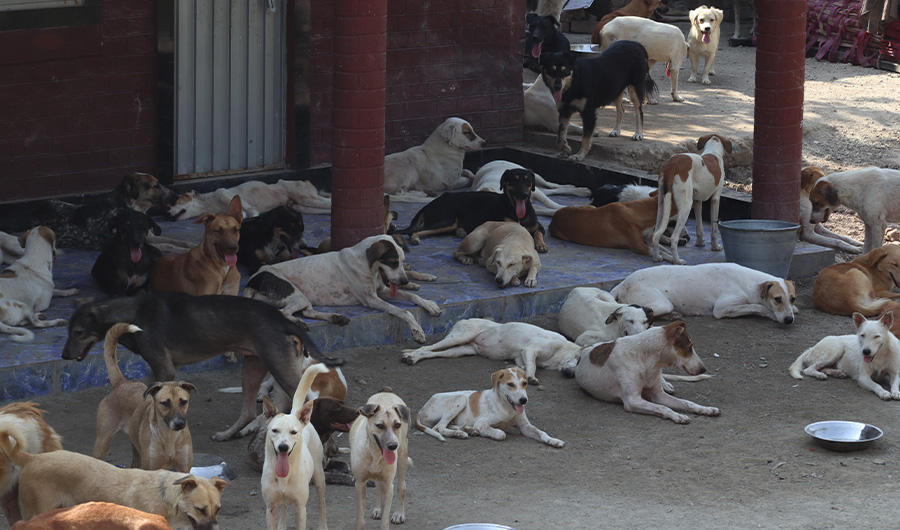
Dogs sit together at a temporary shelter in Lala Kalay near Peshawar, Pakistan on September 1, 2022. (AN Photo)
“Since I was here, I noticed there was a huge need [to help] the innocent and the voiceless on the streets,” she told Arab News on Friday.
LAPS was built for stray dogs who were spayed, neutered and vaccinated before being handed over for adoption.
Masood said authorities warned LAPS about the impending flood, though things happened so quickly that she could not make proper arrangements. The floodwater razed the walls of the animal shelter, forcing her to evacuate about 250 dogs and take them to another place.
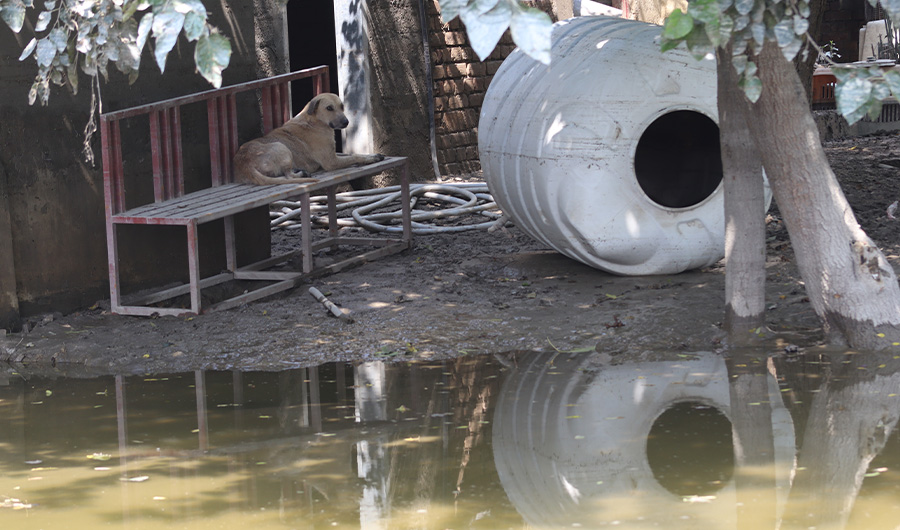
A dog sits on a bench in a flooded Lucky Animal Shelter House in Charsadda, Pakistan on September 1, 2022. (AN Photo)
“You won’t believe how difficult it was for us to take 250 of these dogs out from the shelter and put them in trucks and bring them to [this] location,” she said.
Masood called it a “terrible experience,” as her husband, son and two volunteers rescued these animals from the shelter while wading through six-feet deep water before loading them in trucks at night.
Despite their effort to save all the dogs, 10 of them died while they were being rescued from the shelter. Masood said that no one came to assist her, expressing disappointment with the youth for not stepping up to the challenge.
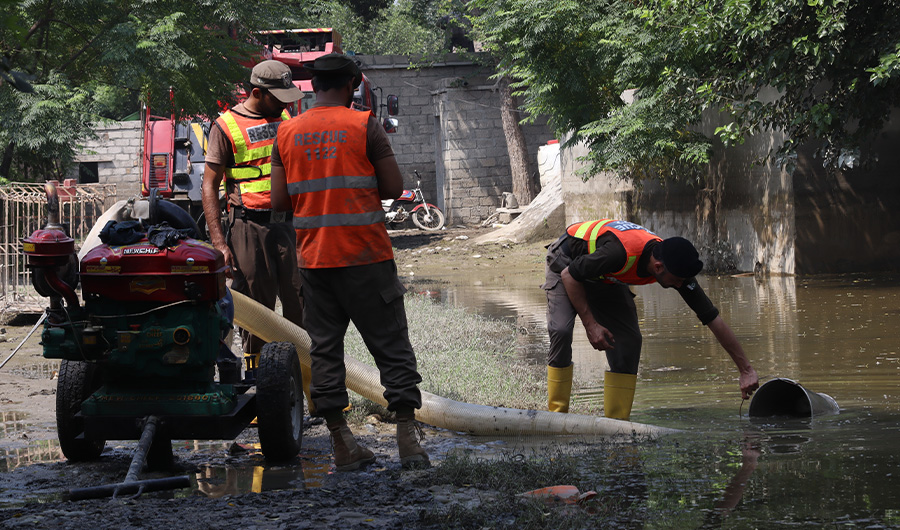
Workers drain water through buckets and a pump from Lucky Animal Shelter House in Charsadda, Pakistan on September 1, 2022. (AN Photo)
“I was a little disappointed that we didn’t have young people help us ... They could’ve come and helped us. We could have saved those 10 [dogs] that we lost,” she said.
Masood took the dogs to a place in Jhagra village in Peshawar. However, the locals complained that they smelled and were spreading diseases. Soon, she was on the road again with her dogs.
“We were harassed and told to get out because [these people] didn’t want [the dogs] in their neighborhood,” she continued. “[The dogs] don’t smell and they don’t carry diseases because all of [them] are vaccinated. We really take care of them, feed them and love them.”
With no option left, Masood took the animals to Lala Kalay where she accommodated them in a two-room rented facility. She said the dogs were scared and anxious due the frequent traveling.
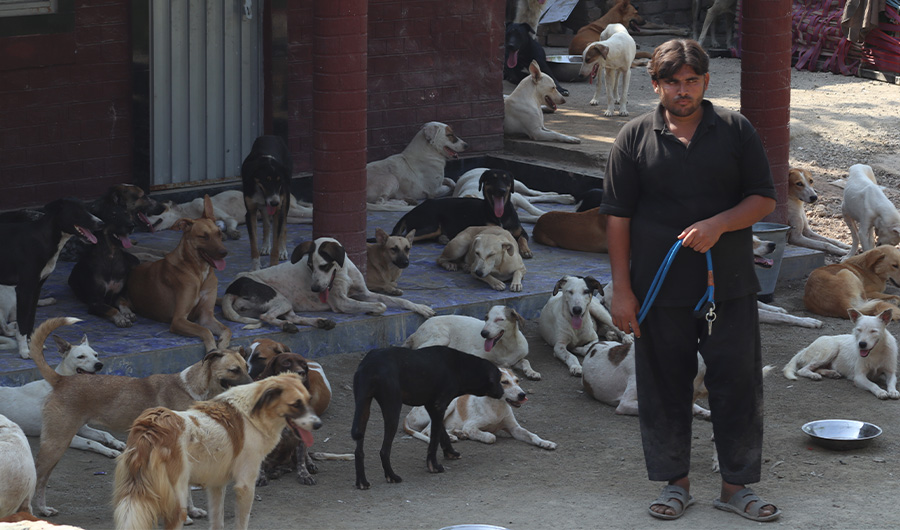
A worker stands near dogs at a temporary shelter in Lala Kalay near Peshawar, Pakistan on September 1, 2022. (AN Photo)
“This is a small place, and it’s all open, and they’re here together, and they’re in a lot of stress,” she added. “We are trying to calm them down, feed them, and give them lots of hugs and kisses till we go back.”
She said she had been feeding the dogs dry food for the time being, though it was quite expensive. She also informed there was no water for the animals in their temporary abode due to which her staff members have to arrange it from nearby areas.
Khyber Pakhtunkhwa’s Rescue 1122 service has saved animals during the floods, including dogs, sheep and cats, from various districts of the province.
Speaking to Arab News, one of its officials said the rescue service saved many human lives while bringing animals to safety.

This photo shows a flooded Lucky Animal Shelter House after torrential rains in Charsadda, Pakistan on September 1, 2022. (AN Photo)
“In this flood period, we have rescued around 6,000 plus animals throughout Khyber Pakhtunkhwa,” Engineer Naveed Akhtar, rescue emergency officer in Peshawar, said. “Now, after the second phase of the flood, rescue teams were busy dewatering different areas, including the Lucky Animal Protection Shelter Houses.”
Masood said she expected to return to the shelter in Charsadda within a week. She added the area was still submerged, making it necessary for her to wait until the place was safe and dry again.
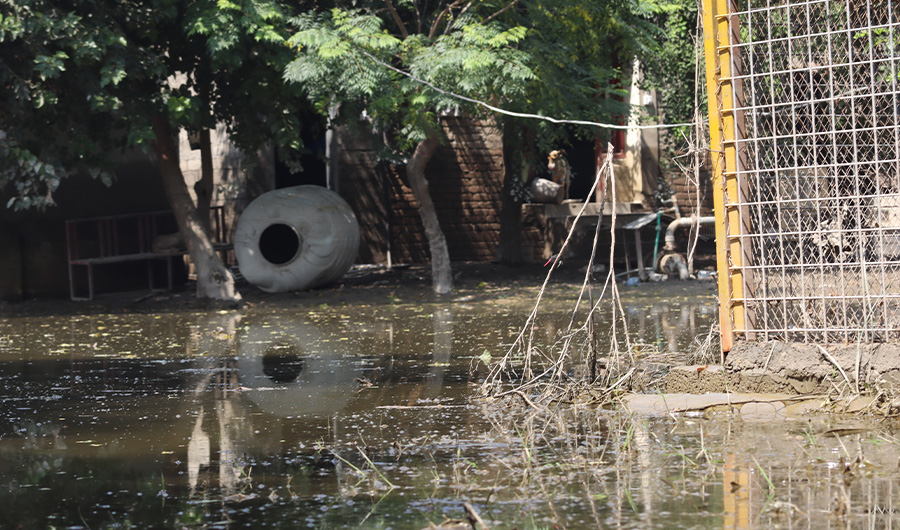
This photo shows a flooded Lucky Animal Shelter House after torrential rains in Charsadda, Pakistan on September 1, 2022. (AN Photo)
“We need a lot of help because we have to redo our place and we have to prepare the place to go back to,” she said. “I would appreciate if people could get in touch and help us as much as possible.”
She noted that the shelter needed food, medicines and any other form of assistance.
“They love guests, they love visitors,” she told Arab News as the dogs barked in their temporary home. “We get a lot of visitors at our shelter. I mean, we have been getting them and [the dogs] love being with [the visitors]. It’s just that because they are so stressed out, anxious and nervous, it’s a problem right now, you know. But they should be fine once they’re back.”















